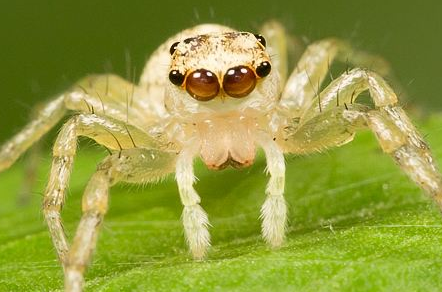The number of insects in the world is decreasing, and there are many insects that are going to die out, and extinct insects will not come back.
The number of insects in the world is declining rapidly, do you know?

Some international scholars have recently published a large-scale study, pointing out that the number of insects in the world is rapidly decreasing. If the situation continues, they may become extinct within 100 years, further affecting the food chain and causing a "catastrophic collapse" of the natural ecosystem. Intensive agriculture is the main reason for the significant decline in insects, especially because of the excessive use of pesticides, urbanization and global warming. In an interview with the Guardian, scholars involved in the study described the situation as shocking, saying that if the situation continued, it would not only have disastrous consequences for the ecosystem, but also could not be left alone.
More than 40% of species are reduced by 1 stroke and 3 are endangered.
Francisco S á nchez-Bayo of the University of Sydney in Australia and Kris Wyckhuys, a scholar at the Chinese Academy of Agricultural Sciences, had earlier selected 73 best studies to analyze insect decline. The studies they cited mainly covered Western Europe and the United States, as well as reports from China, Australia, Brazil and South Africa. The two men's analysis found that more than 40 per cent of insect species are declining, 1/3 are endangered, and insects are extinct eight times faster than mammals, birds and reptiles. The total number of insects (total mass) is decreasing by 2.5% a year, so it is estimated that if the situation does not change, all insects will become extinct within 100 years.
The foundation of the food chain causes a "catastrophic collapse"
Describing the situation as shocking, Sanchez-Bayo said: "the rate of decline is very fast, there will be 1/4 fewer insects in 10 years, only half of the insects will be left in 50 years, and all insects will disappear in 100 years. He cited Puerto Rico as an example, where ground insects have greatly decreased by 98% in the past 35 years. The first to bear the brunt of the decline in the number of insects are insect-eating birds, reptiles, amphibians and fish, which will starve to death.
There are at least 1 million species of insects in the world. They play an important role in biodiversity. They are not only plant pollinators, but also prey on pests, decompose waste, and are the basis of many food chains. Gursing, a professor at the University of Sussex in the UK, said that once insects were lost, everything would collapse. Professor David Macdonald of the University of Oxford also said that once biodiversity is lost, there is no future for mankind.
The study points out that butterflies and moths have declined the most. In the UK, for example, the number of butterfly species common to arable land decreased by 58 per cent between 2000 and 2009. Bees have also fallen sharply, with only half of the bumblebee (Bumblebee) species found in Oklahoma in 1949. The number of honeybee communities in the United States was 6 million in 1947, but so far 3.5 million have disappeared. Although studies have shown an increase in the number of individual insect species that are more resistant to pesticides, they have failed to catch up with the disappearance rate of insects as a whole.
Scholars advocate changing food production methods to save insects
Scholars believe that intensive agriculture is the main reason for the sharp decline in insects because trees and shrubs on the original land are cut down into farmland and are treated with synthetic fertilizers and pesticides. The rate of insect decline accelerated from the 1950s to the 1960s and reached an alarming proportion in the past 20 years. However, in some tropical areas where there is less industrialized agriculture, there are also signs of a decline in insects, which experts believe is caused by climate warming.
Sanchez-Bayo points to the new pesticides used in the past 20 years, such as nicotine (neonicotinoids) and fipronil, are quite harmful because they persist in the environment, kill larvae, and are also affected in protected areas, where 75% of the insects disappear in Germany.
To avoid a decline in the number of insects, Sanchez-Bayo believes that the method of producing food needs to be changed, such as increasing the proportion of organic arable land.
- Prev

What is a mullet? What is a mullet roe? Taiwan mullet seed jumps to national competition
Do you know mullet? Mullet is also called mullet. It is a migratory fish. Ten days before and after the winter solstice, when the cold current hits, mullet appear in large numbers near the Taiwan Strait to migrate and spawn. For hundreds of years, mullet has never broken its promise, so it is called "letter fish." Xia and Shang dynasties
- Next

Argentine cherries are imported into China, and the natural conditions of cultivating cherries in Argentina
The cultivation of cherries in Argentina is very successful. Do you understand the natural conditions in which Argentine cherries are imported to China and cherries are cultivated in Argentina? Let's take a look. China and Argentina have officially signed the General Administration of Customs of the people's Republic of China and Agen
Related
- A one-day flower show brings 130 million yuan in orders! Nanhai, this Phalaenopsis exhibition is amazing
- What do the flower language and meaning of Lutheran tree mean? Precautions for planting Lutheran tree
- Encounter Chaoshan Kongfu tea, not without this cup of Phoenix single clump
- The durian market in Vietnam and Thailand is flooded. The price of imported durian has plummeted by 30-40% in a month.
- Shanghai solved the problem of local vegetable supply by planting 80,000 mu of green leafy vegetables.
- Wageningen University has become the best agricultural university in the world for the seventh time in a row.
- The strongest export season of South African grapes is full of challenges, with exports to Russia falling sharply by 21%.
- Sri Lanka is on the verge of bankruptcy, "Tea for debt" Organic Agriculture Revolution aggravates the Food crisis?
- Turning waste into earthworm manure and worm manure into organic fertilizer-A new choice for auxiliary farming
- Organic rice growers shoulder the responsibility of nurturing agricultural talents! Yinchuan Sustainable Farm with Organic Life Camp

